Farscape, the Henson Company’s extravaganza of a gonzo science fiction TV series, filmed in Australia at the turn of the last century, weirder and grosser and funnier and more brutal than almost any other piece of SF television—a show where a puppet, playing Dominar Rygel the XVI, sluglike deposed ruler of the Hynerian Empire, farts helium for plot purposes more than once—has at its center a drama of profound ethical transformation. By this I am of course referring to the journey of the show’s protagonist, John Crichton.
Farscape is a brilliant piece of television for many reasons—compulsively enjoyable, incredibly weird, emotionally challenging. But it is the ethical journey of John Crichton which, for me, makes it worth watching and rewatching, especially as our own world veers out of the predicted, understandable, comfortable place some of us believed we dwelled in, and into something far closer to what Crichton calls the “weird, amazing, and psychotic life. In Technicolor,” that he found through a wormhole to the farthest reaches of the galaxy. In looking at what happens to Crichton over four seasons and a miniseries, I find myself thinking about the lasting effects of trauma, and the experience of trying to find a new, solid self in a universe gone off the rails.
John Crichton looks like an everyman protagonist, when he starts out. He’s an astronaut, a scientist, a pilot for IASA (Farscape’s slightly-futuristic International Aeronautics & Space Agency), doing an experiment of his own design in a ship of his own construction, hoping to figure out how to use gravity and physics to help humanity explore the stars. We see him in his cheerful, NASA-esque beige-and-white flight suit; an all-American Southern boy with daddy issues and a big brain, out to prove a theory and make a point, but not out to get anyone. Of course his experiment goes awry and he is sucked through a wormhole into a distant part of the galaxy (bad enough!) where the very first thing he does is commit vehicular manslaughter (some other guy, driving his spaceship badly towards a space battle, clips John’s unexpectedly-appearing shiplet and careens himself into a fiery death by asteroid collision.) Things get worse from there. John is immediately entangled in the politics of a group of alien escaped prisoners and their getaway vehicle, the living ship Moya. He’s also made his first enemies: the man who he got killed is the brother of the somewhat unhinged commander of the fleet those prisoners are escaping from…
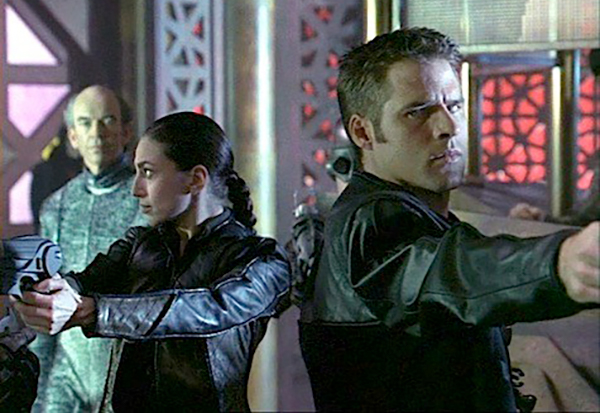
But a recounting of the perils of John Crichton, which are many, varied, delicious, and overwhelming, is not what we’re here to do. We’re here because he doesn’t stay that paragon of space-age Americana, a genuinely good and funny and ambitious man in a terrible situation. We’re here because the vast and incomprehensible universe he finds himself in warps him almost beyond recognition, so that in the episode “La Bomba,” late in Season 4 (the last full season of the show, not counting the Peacekeeper Wars miniseries), he has become the sort of man who straps a nuclear bomb to his crotch and stages an act of terrorist negotiation. Does he have reasons to do this? Of course he does. But they are so entangled in what the farthest reaches of the galaxy have done to him, and how he has responded to these challenges, that they seem almost incompatible with the man who had left Earth and then spent nearly all of those four seasons trying to get back to it.
He’s fallen in love, and made real friends. He’s been made to identify with the oppressed and the alien, the fugitive and the political underclass. He’s been driven quite literally mad by a possessing spirit of one of his greatest enemies, rendered perhaps not-quite-human by the machinations of a long-vanished race of aliens who implanted the knowledge of wormhole technology in his brain, and has become both an intergalactic hero and an intergalactic villain. He’s stopped a war, and started one. He dresses for his new persona—first as a disguise, in the Season One episode “Nerve,” where he dons the identity and clothing of a Peacekeeper special ops captain in order to try to save the life of his friend and lover Aeryn Sun—and then as a matter of course, choosing black leather, dusters, a very large gun he names Winona. He shifts accents at the drop of a hat, or under the influence of a prevailing wind. He learns to make use of what the Uncharted Territories have done to him: relying on risk-taking, bravado, unpredictability, and a cavalier disregard for his own skin to get himself and his people through.
He is not at all sane, John Crichton—and he knows it. He becomes the kind of person who can make choices—some bad, some good, all necessary—that respond to the un-saneness of the world he lives in now, and his own damage. And eventually, he does get to come home to Earth, in the middle of Season 4.
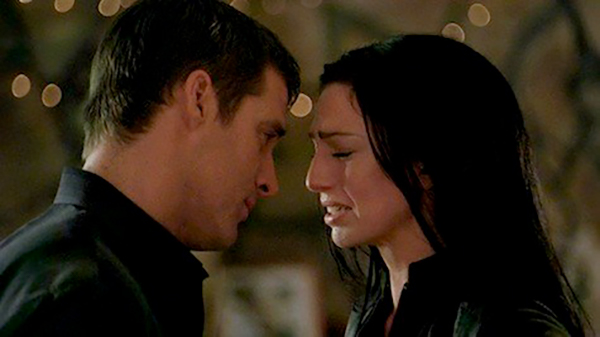
But once he gets there, he finds he no longer belongs. Adrift in post- 9/11 America, John sees humanity as paranoid, dangerous, and parochial. He is exquisitely aware of both the fragile majesty of human beings and our planet, and the profound danger that he—entangled by this point in an interstellar war between the Peacekeepers and their ancient enemies, the Scarrans—and the rest of the universe beyond the wormholes represent. He has seen too much, and gone too far out of himself, to return to what or where he was. At the conclusion of the episode “Terra Firma,” he chooses to leave Earth for good. He goes back to Moya, to his new found family of refugees, revolutionaries, and allies, and to the possibility of romance with the alien woman he has irrevocably fallen in love with, Aeryn Sun. John calls his father to say goodbye, and to ask him to work to make humanity a species that will be ready for the horrors and wonders of the universe—horrors and wonders beyond its current comprehension. It is a choice he could not have made if he had not been changed; if he had not been hurt; if he had not been traumatized and learned how to live with his trauma, to exist perfused in it and keep going.
Buy the Book
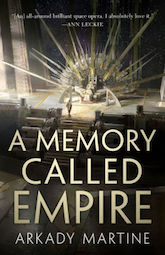

A Memory Called Empire
The choice he makes is an ethical one, a challenging one. It suggests that a person cannot slough off trauma like a shed skin; that change must be lived with, accommodated, anticipated. That sometimes you can’t go home. It is a surprising and radical move for a show which had been framed, up until this point, around Crichton’s quest to get back to Earth—and it comes not as a season-ending gotcha but as a season-midpoint reframing. What if the response to trauma, change, and knowledge of the weight of the world is not, ideally, to return to the place you were before all that happened to you? What if it was instead to acknowledge those changes, and make new choices from the standpoint of living in a world in which you have indeed been hurt? Suddenly a whole new horizon of possibilities opens for the show, and its resolutions are no longer those of the hero’s journey, where eventually the protagonist returns to where they started, having accomplished a great task. They are resolutions framed in something entirely different: the questions of how to live in a damaged universe, a damaged mind, a complicated and unfixable internal and external place—and how to make a life there, and do good from there.
Of course it isn’t easy for John. It’s not easy for anyone to live with trauma. The person John Crichton ends up being when he figures out that he can’t go home again isn’t really that great, to start with—see under the episode with the nuclear terrorism. His first task, back out in the Uncharted Territories (along with, y’know, stopping a war), is to figure out how to rebuild a better person who can live where he has found himself. Farscape’s concluding miniseries Peacekeeper Wars tackles this directly. No spoilers—it’s worth seeing for yourself—but I, for one, think John manages it by the end.
We could all do as well.
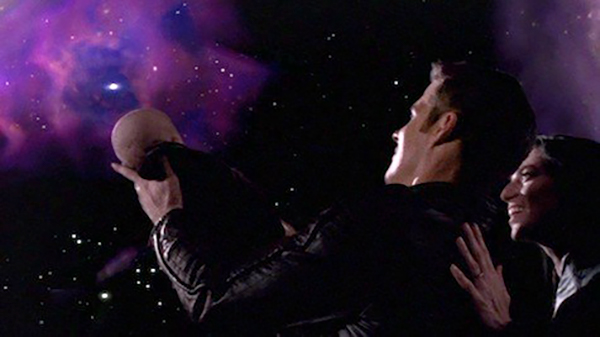
Arkady Martine writes speculative fiction when she isn’t writing Byzantine history. She is overly fond of borders, rhetoric, and liminal spaces. Her novel A Memory Called Empire publishes March 26th with Tor Books. Find her on Twitter as @ArkadyMartine.










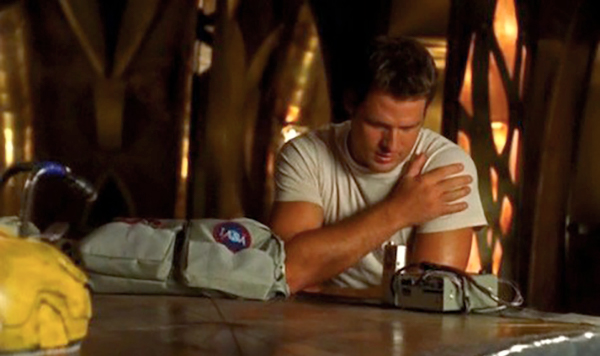
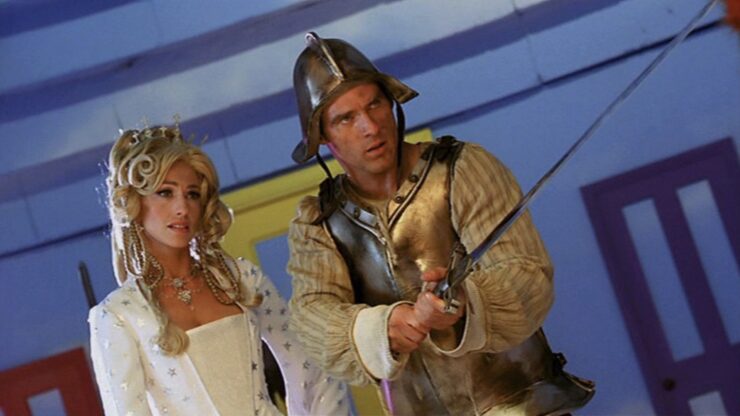
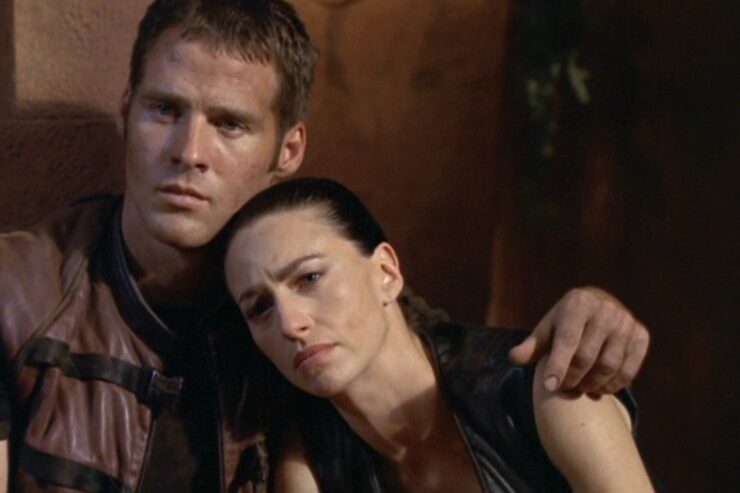


This is the first time Farscape has sounded interesting enough to possibly watch.
I know this was 5 years ago, but what on earth does that mean? It was always interesting, albeit a cult show, but it works best because it isn’t mainstream. I know nobody is interested in Sci-fi or action nowadays unless it’s mainstream, and that’s why you’re missing out.
What a great article about my favorite show. The changes John and the rest of the crew go through are amazing and outstanding for each of them. The hero and villain aren’t your “normal” hero and villain as we were taught to perceive them. We can become each ourselves if pushed far enough and Farscape shows us that this is true.
Plus we had the greatest love story ever with John Crichton and Aeryn Sun. The way they both “met in the middle” so to speak with each other so in tune with each other they moved and thought in sync in later episodes. They were what had me hooked.
Farscape is such a good series, but it’s not one I go back to all the time. I’ve rewatched Babylon 5 more often. I do own both on DVD and when I go to the shelves, it’s Bab 5 I grab. Maybe Farscape is just a little too weird for me, though I have watched it a couple of times.
John Crichton is the true hero for the late Gen-Xers and early Millennials, because of that 9/11 shock. He sees the way the world has turned with the same horror they do. One day things were happy and fun, the next day there were frothing mad paranoid military braggarts running amok and there seems to be no way of stopping them and all that is left is walking away until they bring about their own destruction of figure out why literally everything they’ve done since Sept 12 2001 was wrong. I endorse John Crichton and his magic crotch bomb.
“One day things were happy and fun, the next day there were frothing mad paranoid military braggarts running amok and there seems to be no way of stopping them and all that is left is walking away until they bring about their own destruction of figure out why literally everything they’ve done since Sept 12 2001 was wrong.”
And in 20 years, has that really changed? We’ve changed certainly, but for the worst.
This pretty much encapsulates why I loved the series. I would add that this sort of character growth applies to all the characters on the show, not just Crichton – the murderous Peacekeeper officer is forced to think for herself and make ethical choices (and gets a couple of story arcs in which she learns that she can’t go home again, either); the Priestess is forced to make choices with no morally clean options, the warrior must accept personal disgrace in service to the greater good, the Dominar turns out not to be just Dr. Smith in a frog suit, the Pilot is expiating an ugly backstory, etc. The whole crew of Moya are forced by circumstance into actions which tarnish them morally in ways that they can’t easily come back from.
This sort of moral complexity has become more common in serial TV drama these days (eg, new BSG, The Expanse, new Lost in Space), but Farscape got there first. It used to be that shows had one designated Good Guy or group of Good Guys (eg, Star Trek TOS), whose agenda was by definition, the Good Agenda, and anyone who departed from or opposed it was by definition Bad. Or at least wrong; once in a while you would have an episode or two in which a member of the Good Guy’s team would dissent, but by the end of episode, or at the latest the next, they would be shown the error of their ways and be brought back into the fold, if not, they were pretty much always doing what pro-wrestling calls a heel turn. Designated Bad Guys didn’t have much in the way of rational motivation besides being greedy, selfish, or stupid.
That kind of simplistic moral universe has given way to one which multiple characters have conflicting, valid agendas, without being designated in the show as obviously immoral – new BSG is a good example – and Farscape was at the forefront of the change, with even the notional “Bad Guys” being given rational motivations for their actions.
@5 The difference between Farscape and the serialised shows was that Farscape still managed to put an adventure each week in with the ongoing storyline, except for clearly flagged multiple parters. You can dip in an out. Plus Farscape has a sense of humour and relatable characters, and despite it all, a firm moral centre and moral stance.Basically it is nothing like those super-serialised slow motion doom and gloom factories which are just excuses in finding the most disgusting way to act no matter how little sense it makes.
We need more shows with firm moral centres and which don’t immediately try and find something terrible to do over something good but difficult.
Great show. I wish it was available on Amazon Prime.
@6 Like I said, Farscape was a transition point to a more mature type of storytelling; the first season was mostly episodic, but by season two it was getting much harder to follow without understanding the continuity.
And while it still had a moral point of view, the actual characters wound up doing a lot of irredeemably immoral things (for valid reasons, in the context of the show) – they did robberies and murders (including at one point blowing up the command carrier with children and non-combatants aboard). Yes, they were likeable characters and were written with a sense of humor, but let’s not pretend their hands were clean by the end of the series.
I know people who can’t get past the Muppets in SPAAAAAAACE!!!! aspect, but the Henson workshop provided a way to keep costs down and still present all these wild alien creatures that today can be done as mo-cap without breaking the bank.
Not every episode is stellar. There are silly episodes (and some of those are some of the most fun, even if they don’t really advance the plot — body switching has never been done better).
If all that Farscape did was introduce Claudia Black to the wider world (or at least to me, at any rate), then it was well worth it. That it was so much more is icing on the cake.
Great article, Farscape is one of my favourite shows, and that moment in season 4 one of the most powerful I’ve seen. I think Xena did have some similar moments with the juxtaposition of high ideals and reality; Xena’s hope that she’ll be good next to the reality of living in a violent world. Crichton’s was more an assumption – why wouldn’t peace be easy? Actually it reminds me a bit of losing religion. How could Crichton go back to a world which believed they were the centre of the universe, rather than a tiny, helpless backwater? Reality may have been painful but once you know it, you can’t go back.
One of the most fun things about rewatching Farscape is adjusting to how BONKERS it is. I think British actors and American stage actors have sort of developed a method for acting in absurd sci-fi stuff, but this was the first big Sci-Fi show in Australian and the antipodean guest actors who play aliens are SO WEIRD. Everyone was trying so hard to make the show distinctive and interesting; sometimes it’s a bit much, but even when it’s bad it’s not boring.
…Except for Jeremiah Crichton. But the DVD commentary on that episode is great.
@8 “Like I said, Farscape was a transition point to a more less mature type of storytelling;”
FTFY.
Soapy serialisation, and the amoral misery shows that use it are actually far more juvenile than a good old fashioned anthology show.
Great article, I enjoyed but:
You forgot “with movie star good looks.”
This is decidedly not an “everyman.” This is a “1 in 100,000,000 man.”
I second the wish for Farscape to be on Amazon Prime so that more people can discover its gonzo wonder. Fortunately, I own the DVDs.
Great article! One of the things I love most about Crichton is that he isn’t “okay” at the end of each episode. He survives, sometimes just barely other times more so. Everyone on Farscape has baggage. Their flaws are not just plot devices brought out when needed nor are their relationships. It is time for John and the Moyans to return! #farscapenow
Thank you for this brilliant critique of John Crichton and through these comments Farscape. I agree with those who said that each of the characters on the show went through deep changes due to the gray morality of the UTs and their reactions to the trauma of their lives.
John Crichton is his own type of hero. His father set up the motive and theme of the show in the Premiere when he told his son that he would discover his own type of hero and that’s what happened. But as you wrote so well here, he had to move through and accept his changes — such as what his mother said in Season 2’s epic episode, Won’t Get Fooled Again: “You’ve changed.” and John said back, “People change.” she said, “You’ve killed!” and he can’t deal with this Scarren-produced mother because we find out he couldn’t bear to watch his real mother die of cancer and wasn’t there for her. Human John carries secrets and Ben Browder was emphatic that we not learn much about John’s skeletons and relationships on Earth. He’s a complicated man and not the All-American cowboy he seems. I think that’s why he can adapt and learn from his trauma and having Harvey in his head.
Ben Browder deserves enormous kudos for playing this convoluted and complex character with humor, pathos, deep emotion and physicality. He inhabits John Crichton’s skin and moves the amazing story towards its all too short climax in Peacekeeper Wars. Without Ben’s leadership and acting skills (as well as scriptwriting skills) I think it would have been a lesser show.
As someone who is greatly invested in Farscape both personally (it’s one of my favorite shows) and professionally (I co-wrote the followup comic book with the show’s creator Rockne S. O’Bannon, which was published by BOOM! Studios from 2008-2011, as well as more Farscape fiction in novel, comics, and short story form), this is one of my favorite pieces I’ve seen about the show. Crichton’s journey is a fascinating one, and this is a great examination of it.
(As for Rygel, yeah, he farted helium, but much more important was that he was — by far — the smartest person on Moya, and that included when Scorpius was on board. In addition, he embodied the essence of Farscape in the episode “Thank God It’s Friday Again,” as Farscape is the only show in the history of television where a character’s flaming pee is what saves the day.)
—Keith R.A. DeCandido
Excellent analysis of one of the most underrated and misunderstood sci-fi series ever produced. Well done, Ms. Martine.
Great article and analysis on one of the most underrated sci fi shows ever. Talk about a show they should remake!
@18/krad, Rygel FTW! That was his finest moment.
It’s been a long time since I thought of Farscape. It was an incredible series, and a large part of that was John’s journey. Thanks for the trip down memory lane.
Rygel and Pilot etc. might have been Muppets, but within one episode they’d become just characters just like the ones played by humans. The Jim Henson company deserve all the praise they got for this show.
Also, I think John and Aeryn are my favourite SFF couple bar none.
Right, time for another rewatch I think :)
Ok, I just got done watching the pilot episode.
Oh, boy, down the rabbit hole I go…
One thing missing from the article that, for me, makes it incomplete is that the show actually examined how experience changes John. There’s a moment in the show where John is duplicated, and the two are identical in every way. They illustrate this by them playing Rock-Paper-Scissors and making the exact same choice over and over again, forever tying them.
Instead of putting in John on a bus at the end of the episode, the series then follows both John’s as one leaves Moya, and examines how their different experiences changes them in different ways. When they finally chose to end one John’s story, they give him the chance to send a final message to the other John. The use this to illustrate the new differences as the last moment of the message is them both spontaneously and silently playing a game of Rock-Paper-Scissors, and making a different choice to the other…
I love FARSCAPE, and not just because I edited the novels for Tor. And I will still argue to this day that John Crichton and Aeryn Sun is the greatest romance in SF television.
Drives me nuts when folks dismiss it as “Muppets in Space.” FARSCAPE was amazing.
Great article that hit the appeal of the show for me on the head. One of the aspects of the show that I love is the way it subverts the standard action/sci fi military tropes. And yes, there are whole swatches of episodes and even a season that I dislike entirely, but overall, it’s a show that holds up well. What is also impressive is that all the characters undergo transformation.
What I love about Farscape is the general lack of a reset button. Crazy, weird and horrendous things happen, and everything has consequences, sometimes reaching far down the line.
One of the best time travel stories I’ve ever seen is is this show, when the crew is at some peace memorial, and accidentally go back in time and just by being there changes everything into total disaster. And then they try to go back again to put things right, and things just get worse and worse. In the end (spoiler warning) they do manage to fix things to a certain degree — peace was achieved, but not in the diplomatic and inspiring way it was originally; rather at a very great cost. No easy fixes, no moral high ground, no typical happy endings.
I watched, I t hink, most of the first season. I did enjoy it, but I was turned off by what I saw as a total reset between episodes. There were a bunch of episodes where the subplot was “we don’t trust each other and we’re suspicious of each other’s motives.” End of episode, “we are better people and a team now because we have learned to trust each other.” Next episode: “We don’t trust each other and must learn to do that” all over again. It finally turned me off, I’m afraid. I may have to try again soon.
One thing I would like to mention, and it is perhaps a difficult thing to put into words: what Farscape did was portray all characters, stories and events in way that is real.
Real means funny, deep, colorful, sad, romantic, idealistic at times, dark, imaginitive, dangerous and with permanent impact. Characters change, the universe changes,forever.
Today’s shows consider gritty, grey, moral-less characters and shocking, “serious” storylines to be “real.” That is not reality, just a passing fancy.
And this is why many who give Farscape a chance end up loving the show.
And why this happens.
Unfortunately, Farscape’s problem today (and always, I might add) is marketing. No-one knows about the show.
This is a great article and one of my absolute favorite things about Farscape!
Thanks so much for writing this. Farscape was one of the best science fiction series ever made and absolutely should not be forgotten. It was weird, crazy, and also explored the consequences of actions. And man was it good at villains. I still wish it hadn’t gone away before its time.
@@@@@#26 For me the dual Crichtons was when a great show turned into a genius show. They figured out a way to both have their cake and eat it too while exploring storylines with each of the versions while never having one of them be the “Real” John and the other be the “Fake” John. You got to watch this character change into two completely different people before your eyes and while one’s heart would be breaking the other would be off having a party at a beach planet. It allowed you to rest between major story beats while not feeling that one episode or the other was “Filler”.
I don’t see any other series topping that in my lifetime.
I’m currently re-watching the series with a friend and it’s still amazing. The last episode we saw is one of the best, Crackers Don’t Matter. There’s so much to be said for this series and not enough people saying it. Here’s hoping the movie eventually gets off the ground and re-introduces the world to one of the greatest adventures ever.
I loved “Farscape” Series when it was originally out. I was lucky enough to buy the Video Collection of this series in VCR format, which I can still view on the equipment I have (a combo VCR/DVD player). I’ve seen comments here that say the Series is back up and available for viewing on our video screens at home? I haven’t seen anything announcing it. I thought the stories, and the acting talent were fabulous! Sigh.. gotta find it again, I guess.
A terrific, terrific article!!!!!
Which I totally agree with, btw!
I so wish that FARSCAPE had continued!
Still the BEST scifi series EVER! After all these years, no other series has dislodged it from my #1 position. Needs to be streaming on Netflix or Prime.
I watched this show religiously when it first came out when I was late teens/early 20s, and then college and life happened, and I stopped watching around the beginning of season 3, after Zhaan left. I saw it on amazon prime last month and decided to binge watch it, and I’m glad I waited until now to watch the whole series and miniseries. You have hit the nail on the head about why this show was brilliant. I would not have understood it fully in my tender youth, as I remembered it as just another fun “Star Trek” type show. But this series was so much weirder, darker, and richer than I had remembered. I’ve gotten a lot more out of it now, and yet, I don’t think the show would have worked in any other time frame than the bizareness of the late 90s/early 2000s.
There were times I was watching the stranger episodes (like the one where John dreamed everyone as cartoon characters) where I honestly could not tell if what was going on was completely stupid or completely brilliant, and I think that was all on purpose and part of the show’s genius. The writers weren’t afraid to take risks because they had taken us to the furthest reaches of the universe AND the furthest reaches of Crichton’s sanity. And while it was a fun ride, it was also an often disturbing and reflective ride. We WERE John, in some ways, seeing everything with new eyes (great eyes, with better than 20/20 vision, and they’re BLUE). The show was also uniquely wonderful about using all five senses to draw the viewer in (even tastes and smells were described or shown that completely immersed the viewer into the Farscape world). So we experienced with John all the wonders he had seen, but also all of his desperation and all of his remorse and all of his madness. John didn’t come out of the show with clean hands, and really, neither did we.